Iran’s Chief Diplomat Says Efforts To Reach A Nuclear Deal Continue
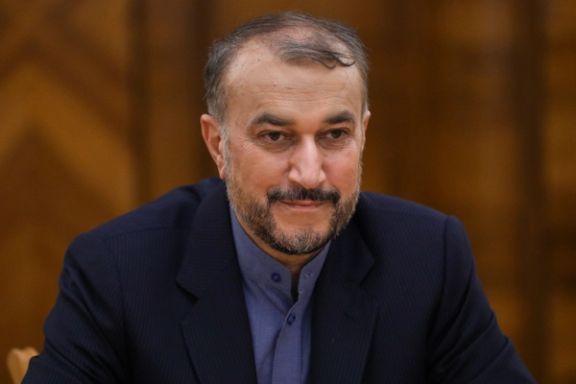
Iran’s foreign minister Hossein Amir-Abdollahian told UN General Secretary Antonio Guterres that diplomatic contacts continue to revive the JCPOA nuclear deal.

Iran’s foreign minister Hossein Amir-Abdollahian told UN General Secretary Antonio Guterres that diplomatic contacts continue to revive the JCPOA nuclear deal.
Amir-Abdollahian, stated that communications with the United States are taking place, and an initiative by Oman remains on the table. If the other parties are willing, Iran is determined to return to the JCPOA (Joint Comprehensive Plan of Action).
The Iranian foreign minister met with Guterres, the Secretary-General of the United Nations, at the UN headquarters in New York on Friday.
The diplomatic efforts of the United States and Europe to address the Iranian nuclear issue come at a time when Israel considers these actions insufficient and emphasizes the need to increase pressure and resort to serious military threats.
Negotiations to resurrect the JCPOA, which former US President Donald Trump abandoned in 2018, collapsed about a year ago. Washington has been exploring alternative approaches to encourage Tehran to curb its nuclear program. Recently, the Biden administration released a total of $8.7 billion in Iran’s funds blocked in Iraq and South Korea.
Amir-Abdollahian also had a meeting with his Saudi counterpart in New York. According to the Iranian Ministry of Foreign Affairs, where the two sides discussed bilateral relations and regional issues.
Saudi Crown Prince Mohammed bin Salman, in an interview with Fox News on Thursday, highlighted the danger posed by Iran potentially acquiring nuclear weapons. He stated, "If they obtain one, we'll have to acquire one for security reasons and to maintain the balance of power in the Middle East. However, we do not wish to see that happen."

Iran has stationed 10 brigades of its traditional army’s ground forces along its borders to deter “enemies” Gen. Kyumars Haydari was quoted as saying on Sunday.
Gen. Haydari did not clarify if these forces all belonged to the army or also included unites from the Revolutionary Guard’s ground forces. He also did not provide a numerical estimate of the forces, but a brigade is usually around 3,000-4,000 troops.
The Islamic Republic has maintained its traditional army while heavily investing in the Revolutionary Guard that in many respects commands stronger and better trained units.
Gen Haydari who is the commander of the army’s ground forces said that these brigades are stationed in the northwest, west, southwest and northeast to confront “enemies”. Iran has been projecting military power along its borders with Iraq to deter what it calls separatist Kurds using Iraqi territory as a base.
With recent clashes and tensions between Armenia and Azerbaijan, Iran’s northwestern neighbors, Tehran has also sent forces to the area possibly to deter Baku from invading southern Armenia and cutting Iran off from its friendly neighbor.
Iran has also faced intermittent incursions and hostile fire from the Taliban in the northeast, who have cut off waters from a major river flowing across the border, depriving vast arid swaths of territory from its traditional source of irrigation.
Haydari, however, said that the deployment “does not mean an immediate danger threatens the Islamic regime,” rather it is meant to boost readiness and to be in a better position to monitor the borders. He added that it is important for ground forces to “to feel themselves in the trenches,” according to the commands of Iran’s Supreme Leader Ali Khamenei.
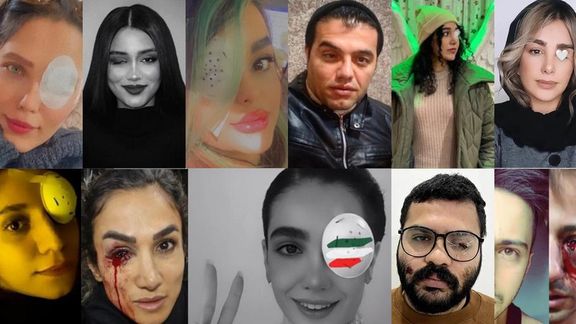
Iran Human Rights (IHR) says analysis of protester deaths and eye injuries reveals that women’s eyes and faces were intentionally targeted during last year’s protests.
In a new report, the Oslo-based non-profit based its argument on statistical data gathered about the protests that began in mid-September 2022 and spread across the country. “Women made up 9% of slain protesters and 28% of those who sustained eye injuries,” the report said.
Security forces in Iran use a shotgun shell known as ‘bird shot’ with small metal pellets that is less likely to kill from a distance but can indiscriminately blind people in a crowd. In November 2022, dozens of ophthalmologists warned against the use of shotgun ‘birdshots’ and other projectiles by Iran’s security forces that they said had blinded over 500 protesters since mid-September.
The number of injured men and women should be proportionate to those who participated in the protests if the shootings were not intentional, IHR director Mahmoud Amiri-Moghadam told Iran International.
“In Mahabad, 15 percent of those killed are women, while more than half, i.e. 56 percent of eye injuries, were sustained by women,” he said, adding that these figures can only be explained by assuming that security forces intentionally targeted women’s faces and eyes.
“[This shows that] an order had come from above to torture these women and ruin their lives, teach them a lesson to cover their faces and heads for the rest of their lives. I think this shows the seriousness of these crimes, even more serious than we thought because it is a pre-planned, targeted crime, far more serious,” he said. “What they did to women by shooting them directly in the face and eyes was not just inflicting bodily harm, it was also a kind of mental and physical torture, and their goal was to terrorize them.”
Intentional aiming at protesters’ faces and tens of cases of serious eye injuries was first reported during a crackdown on water protests in Isfahan in December 2021.
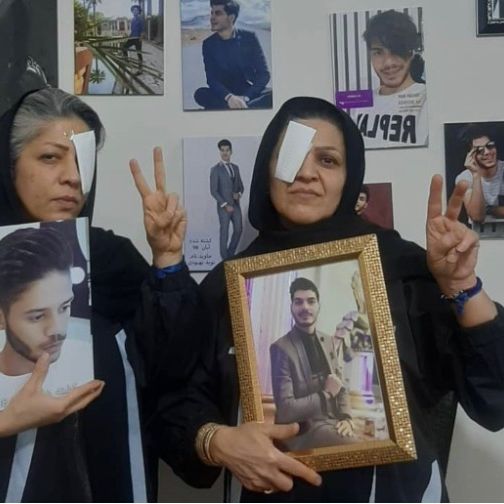
To justify shooting pellets and plastic bullets at protesters which in hundreds of cases caused serious eye injuries, even blindness, authorities argue that security forces were forced to shoot at protesters to stop them from causing harm to others or damaging public property.
The organization has published 95 cases of eye injury and blindness from last year’s protests with names, photos and injury descriptions. Amiri-Moghadam says documenting what happened to the wounded is difficult because they and their families are threatened by security and intelligence bodies. “In 43 cases, we withheld the names.”
Intentional targeting of genital areas was also reported in 2022 protests.
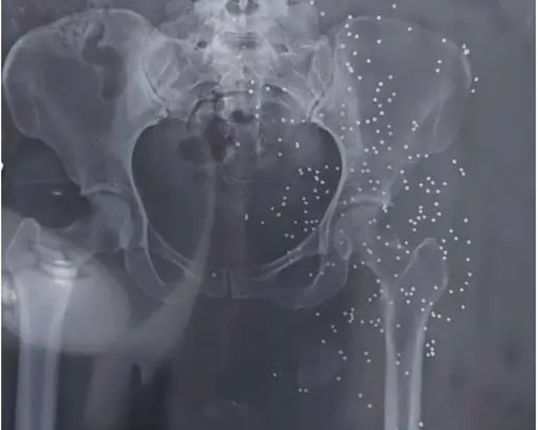
“The international community has formed a fact-finding committee, but what they can do is limited because they are not allowed entry into Iran. What they can do depends on how much documentation they can get. What these eye victims did is important for preventing the repetition of these crimes in the future,” he said.
According to Amiri-Moghadam, the international community will find making more concessions to the Islamic Republic difficult if the fact-finding committee comes to the conclusion that a crime against humanity has been committed and they will be pressured to demand accountability from the leaders of the Islamic Republic.
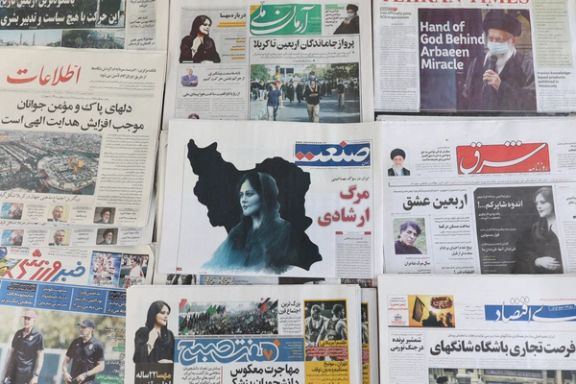
The International Federation of Journalists has issued a warning regarding Iran's recent decision to mandate professional licenses for journalists.
On September 18, the Iranian government announced its intentions to establish a licensing system for journalists operating within its borders. Culture Minister Mohammad Mehdi Esmaili disclosed the government's plan to introduce an accreditation system for journalists. While specific details and dates have not been publicly disclosed by the authorities, if the proposal advances, no journalist will be allowed to practice the profession without obtaining a government license.
Anthony Bellanger, the Secretary-General of the IFJ, emphasized that the implementation of the decision would grant exclusive authority to the government in issuing professional licenses, significantly constraining the activities of journalists operating in Iran.
“The licensing system that the Islamic Republic is planning, that will fall under the total control of the Iranian government, seeks to further tighten its grip on journalists. We totally oppose its implementation and remind the Iranian authorities of their international obligations towards human rights and freedom of speech. Journalism is not a crime, and the Islamic Republic must release all jailed journalists and media workers in the country,” added Bellanger.
The development came shortly after the first anniversary of widespread anti-government protests and a harsh crackdown on journalists and media covering the events. According to an IFJ report published September 15, 2023, at least 100 journalists were arrested and imprisoned in Iran over the past year.
According to the report, six of these journalists, including Niloufar Hamdi and Elahe Mohammadi, who covered the death news about thr death of Mahsa Amini, are still in prison.
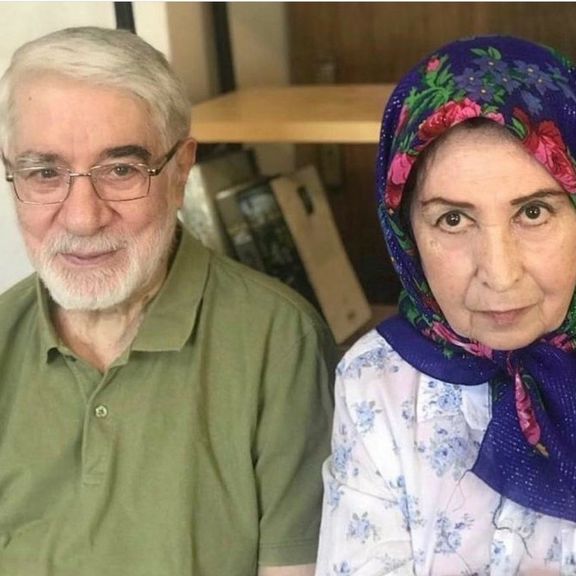
Hundreds of Iranian activists have emphasized that the 13-year-long house arrest of three Green Movement protest leaders is a gradual form of murder.
The Iranian Green Movement refers to a political movement that arose after the June 12, 2009 disputed presidential election and lasted until early 2010, in which protesters demanded the annulment of the highly controversial re-election of Mahmoud Ahmadinejad .
The green color was initially used as the symbol of Mir-Hossein Mousavi's campaign, but after the election it became the symbol of unity and hope for those who demanded a real and transparent tabulation of results.
Mousavi, a former prime minister and his wife Zahra Rahnavard, the leaders of the movement have been under house arrest, living in seclusion under the control of security forces at their home since 2011, as Supreme Leader Ali Khamenei saw their protest as a challenge to his regime.
Over 570 political, social, cultural, and civil activists released a statement on Saturday expressing concerns about the continuation of the house arrest of Mousavi, Rahnavard, and Karroubi.
They also expressed concern about imprisonments, sudden deaths, and hunger strikes of political and ideological prisoners on the anniversary of Woman, Life, Freedom protests.
“The 13-year-long house arrest of these protesting political leaders, which began with a violation of the law, has continued inhumane methods and, as a result of increasing pressure, is currently leading to a form of gradual murder,” reads the statement.
The signatories of the letter emphasized that it is the government's responsibility to immediately release the three figures who are being held in an unjust manner without trial.
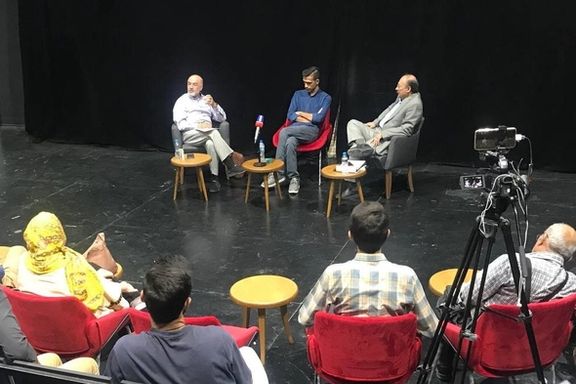
An Iranian academic has criticized officials for denying the country's volatility, amid economic and other crises and a restless population ready to protest.
The Khabar Online website in Tehran has reported a debate between the two academics: Bijan Abdolkarimi, a lecturer on philosophy, and Alireza Shojaivand, a professor of sociology at the Students' House. It appears that many other academics in Iran share Abdolkarimi's critical perspective on the situation.
Abdolkarimi said that he has sent a written version of his criticism to Supreme Leader Ali Khamenei. Shojaivand, on the other hand, charged that some of the regime's critics fabricate comments about the situation's volatility.
He argued that the societal agitations function like a fever, serving as indicators of underlying issues and warning signals for everyone. Abdolkarimi used the same analogy to emphasize that denying these problems could potentially lead to the spread of infection within society.
Abdolkarimi mentioned that he had sent a written version of his criticism to Supreme Leader Ali Khamenei.
Shojaivand, on the other hand charged that many critics portray the agitations as signs of social collapse. However, he noted that while they point out the problem, they often fall short of offering solutions. He even accused some critics of exacerbating societal agitations.
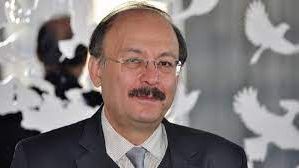
Abdolkarimi largely agreed with Shojaivand's views but disagreed with the accusation against some critics. He also cautioned his fellow academic about polarizing academia by dividing it into two opposing groups: opposition and regime supporters. He stressed that “both of these groups are valuable assets for the country,” also suggesting that laymen may understand societal issues better than experts.
Abdolkarimi stressed that "when people feel a state of strangulation in the society, experts and politicians need to look for the root cause of that feeling." The academic mentioned that he provided his views two months ago when a government body called on a hundred experts to discuss the situation concerning an approaching crisis on the anniversary of Mahsa Amini's death. However, he expressed uncertainty about what happened to his contributions.
Abdolkarimi criticized both the critics, whom he referred to as "the opposition," and the other side of the argument, which he called "the revolutionaries," for lacking a theoretical foundation in their narratives. He also noted shortcomings in the foundational idea of the Guardianship of the Jurisconsult -or the institutions of the Supreme Leader - which underpins the Islamic Republic's political structure.
Abdolkarimi further criticized the Iranian government for politicizing almost everything, furthering an ideological policy, opposition to modernity and other problems including populism, the gap between the people and the government, authoritarianism, and a militarism that hand over the universities and even football clubs to the revolutionary guards (IRGC).
Abdolkarimi further criticized the Iranian government for politicizing nearly every aspect of society, promoting an ideological policy, opposing modernity, and facing issues such as populism, a growing gap between the people and the government, authoritarianism, and involving the Revolutionary Guard in institutions like universities and even football clubs.
He acknowledged that the Islamic Republic faces a succession crisis but warned against oversimplifying the prediction of regime collapse. Shojaivand mentioned he had answers to these issues but preferred to discuss them in another session. For the time being, he pointed out that there are people in Iran unhappy with the government's performance, but this doesn't necessarily turn them into opposition members. Additionally, he cautioned against misinterpreting the regime's willingness to engage in global processes as authoritarianism.






